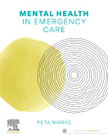
Mental Health in Emergency Care takes a practical, scenario-based approach to help students and recent graduates hone their knowledge and skills to address the mental health needs of people presenting to emergency care settings. Featuring typical presentations across community, pre-hospital and hospital contexts, the scenarios demonstrate how clinicians can identify underlying mental health issues that can often go undetected and contribute to poor health outcomes. Mental Health in Emergency Care 1e provides a framework for thinking about mental health in emergency settings, and how to develop mental health knowledge and skills that can be applied in order to provide more holistic care to all patients. INDICE: 1. Introduction2. Mental health nursing skills for emergency settings3. Practice Setting ScenariosScenario 1: Emergency Department: Rural/Regional or remote Indigenous Australian presenting with a physical health problem and acute MH situationScenario 2: Emergency Department: Metro area. Indigenous Australian presentationScenario 3: Emergency Department: Person presenting with acute mental health & substance useScenario 4: Emergency Department: Person with personality disorder presenting with deliberate self-harm Scenario 5: Emergency Department: 27-year-old woman presents with intentional overdose and traumaScenario 6: 40-year-old Turkish woman with panic Scenario 7: Emergency Department: Person T/F from RACF with delirium/ older adult with UTI, confusion and agitationScenario 8: Emergency Department: Person with eating disorder presents to ED faint, medically unstableScenario 9: Regional Area Emergency Department: Family member of someone who isn't being seen quickly enough shouting and being demandingScenario 10: Paediatric Emergency Department: Child presenting to paediatric hospital ED with acute behavioural disturbanceScenario 11: Royal Flying Doctors Service: Acute mental health scenario - depression and suicideScenario: 12: PACER team PACER (MHNs in police): Person with acute psychosis being paranoidScenario 13: Paramedic/MHN: Person with bipolar (mania) disorder, agitation, irritability, recklessnessScenario 14: Detention Centre: Person in mental health crisis/self-harm/triage in refugee/asylum seeker detention settingScenario 15: Community First Responders after natural disaster: Mental health & nursing in environmental crisis - bush fire4. Self-care for Emergency nurses - mini scenarios including reflection, emotional intelligence
- ISBN: 978-0-7295-4421-4
- Editorial: Elsevier
- Encuadernacion: Rústica
- Páginas: 286
- Fecha Publicación: 06/12/2022
- Nº Volúmenes: 1
- Idioma: Inglés
